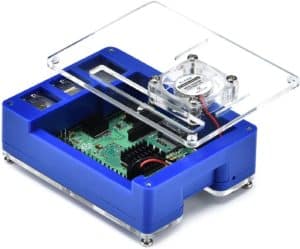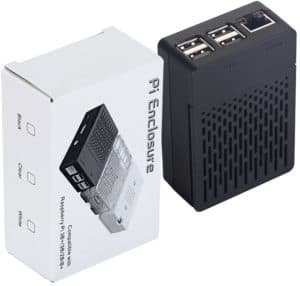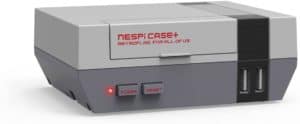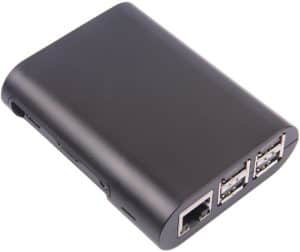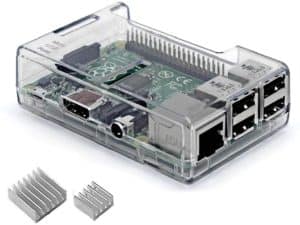Best Raspberry Pi 3 Case in 2025
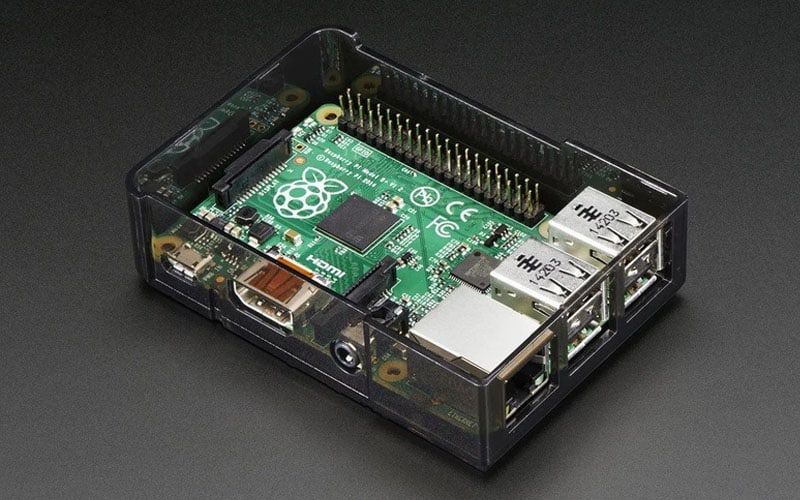
Table of Contents
While enveloping a Raspberry Pi 3 is a protective cocoon is by no means imperative, there’s sense in finding a case can add a spot of visual flair and aesthetic cohesion to Pi project, not to say protect it from swarms of dust particles and the elements, and rather more pertinently for performance, keep it running fresh with a cooling solution.
Since the launch of the Raspberry Pi 4, the successor of the third-generation iteration of the much-loved mini-computer, the number of Pi 3-specific cases has slowly dwindled, but that’s not to say there aren’t plenty of options still out there. On the contrary, a quick Google search for Raspberry Pi 3 bombards you with a glut of options. Which is the best? Is this one worth the money? What about cooling performance? What of build quality?
To save you the hassle of scouring the web for the best home for your Pi, we’ve scanned far and wide for the very best Raspberry Pi 3 cases. Below, you’ll find the fruit of our efforts neatly broken down into our top recommendations.
With the release of the Raspberry Pi 5 slated for release in 2023, you should read up on how the Pi 5 compares to the Pi 4.
Products at a Glance
Ho we picked
In our opinion, nothing beats getting hands-on with a case to gauge whether it’s a winner. We, therefore, did a lot of that while also assessing each based on the quality of the constituent parts and the outer shell, how much exasperated hair-pulling is involved in the assembly process, whether manufacturers made the right design choices, how well the cooling setup works to keep the Pi cool, and to state the obvious, making sure the case is indeed compatible with the Raspberry Pi 3.
Doing so, we thinned down our recommendations to five Raspberry Pi 3 cases. As we always do, we’ve included an option for most budgets, and instead of simply singing the praise of each, taken a critical eye to their flaws. Below, you’ll find a quick review of each that pinpoints both what each does right, but also where they fall short. And, for those that want a few top tips to steer their Raspberry Pi 3 case shopping experience, we’ve pulled together a ‘Things to Consider’ section at the end.
Given that ‘best’ is so subjective, it goes without saying that these are recommendations, and our own preferences played a part in how we picked, so if we’ve missed one that’s caught your eye, do feel free to pop your suggestions in the comments section at the end.
Product Reviews
- Quiet and effective cooling solution
- Easy GPIO and SD Card slot access
- Solid ABS and acrylic construction
- Easy assembly
- Not compatible with Raspberry Pi A+
The GeeekPi Raspberry Pi 3 B+ Case has it all: visual flair, excellent cooling, solid construction, and a great price. Aesthetically, the GeeekPi Raspberry Pi 3 B+ Case does away with the drab black box design we see on so many cases, for a combination of a blue ABS body sandwiched between two transparent layers of acrylic that let you peer in at the Raspberry Pi held within.
The case conforms to the shape and size of the Raspberry Pi 3, granting access to all the ports, including the USB ports, audio, Ethernet, HDMI, and even the SD Card slot, which makes it dead simple to swap out a card in a matter of seconds. For those eyeing up projects that involve HATs, the GPIO is fully accessible when the case is assembled via a cut-out in the ABS body and top acrylic layer.
A complete passive and active cooling setup, consisting of a 30 mm fan and three heatsinks, works efficiently and quietly even when pushing the Pi to the limit. We’re particularly impressed with the fan-sized cut-out in the top acrylic layer. A small touch, but one that does wonders to feed a steady flow of cool air to the Raspberry Pi 3. GeeekPi hasn’t skimped on the fan either, which is a great quality part that runs virtually silent. With Pi cases, it’s often a case of sacrificing cooling for low noise levels, or vice versa, but the GeeekPi Raspberry Pi 3 B+ Case delivers both.
It’s not just great cooling and aesthetics you’re paying for, though. The GeeekPi Raspberry Pi 3 pieces together with next to no effort, thanks to an intuitive design that ensures you can’t put it together incorrectly. As such, even Pi first-timers will have this puppy up and going in no time.
The only real complaint we can throw at the GeeekPi Raspberry Pi 3 is that compatibility is limited to the RPi 3 Model B and B+, leaving A+ owners and their Pi out in the cold.
- Sleek and solid all-black ABS construction
- Good cooling performance
- Removable cover to access GPIO
- Near illegible instructions
- Loud fan
The iUniker Raspberry Pi 3 B+ Case sits second on our list of recommended Raspberry Pi 3 cases for offering a potent mix of a sleek design, an affordable price, and good cooling performance.
Aesthetically opposed to the GeeekPi Raspberry Pi 3, the iUniker Raspberry Pi 3 B+ Case opts for a more inconspicuous overall look with a solid all-black ABS shell that won’t turn heads but should slide easily into projects where looks aren’t important, and a discreet Pi casing is required. It’s a rugged case that feels well built and is well designed to house the Raspberry Pi 3 B and B+.
The case consists of three layers: one on the underside, one middle section with cutouts for the headers and pins on the Pi 3, as well as the most heat-producing parts such as the CPU and RAM, and a top cover that grants easy access to the GPIO pins. You also have full access to all the Raspberry Pi 3’s USB, HDMI, audio, and Ethernet ports.
Cooling is well covered with a 30 mm fan mounted to the top cover, vents on the top and bottom layers, and a three-piece heat sink set. These keep the Pi running cool, up to 10-degrees cooler than without the case, but note that the fan is loud when set to full speed mode. It’s an unmistakable din, almost a whine, that may bother those than want a quieter Pi setup.
While assembly is straightforward, the instructions are printed in a minuscule font that is a real struggle to read. The same applies to the illustrations.
- NES-style design
- Functional front power/reset buttons
- Font mounted USB ports for controllers
- Easy access to all RPi 3 ports
- No GPIO access
- Involved assembly
With the Raspberry Pi 3 such a favored solution for retro gaming systems, we felt that a gaming-geared case should feature among our recommendations. Among those designed to house a Raspberry Pi 3, the Retroflag NESPi Case+ is easily one of the best.
The headline is, of course, the NES-style design. Rather than simply adapting the general shape of Nintendo’s cult console, the Retroflag goes even further to incorporate functionality into the design. Chiefly, the case features functional front-mounted power and reset buttons mimicking those found on the NES, two USB ports where the controller inputs sit on the original console, and below the cartridge cover, access to the Pi’s Ethernet and two other USB ports. Additionally, the back houses the HDMI, audio, and power ports. As such, you have full and easy access to all the RPi 3 ports, although anyone hoping for unrestricted GPIO access should look elsewhere.
On the cooling side of things, the Retroflag NESPi Case+ includes a three-piece aluminum/copper heatsink set and a 30 mm fan. These keep the Pi running cool, but as is so often the case with Pi cases, the fan is loud and can even cause the case to vibrate – a minor issue in our book, especially when drowned out by game audio.
Assembly is more involved than regular Raspberry Pi 3 cases due to the shape and size of the case and the fact it uses port extenders. Still, well-guided instructions should see even beginners power through without too many issues.
- Simple, slim, functional, no-frills design
- Silent operation
- Access to all RPi 3 ports
- No easy GPIO access
- No cooling solution
While the above cases have their place in Raspberry Pi 3 setups, some applications require a simpler design free of distracting visual flair. To that end, we’ve selected the JBtek Jet Black Case as our top simple yet functional Raspberry Pi 3 case.
Only ever so slightly taller than and otherwise perfectly flush with the Raspberry Pi 3 board, the JBtek Jet Black Case is a stripped-down all-black case that delivers a no-frills, functional home for your Raspberry Pi 3. There are no fancy design choices or transparent acrylic here, just a slim, no-nonsense case that feels sturdy and reliable. Such simplicity naturally translates to a low asking price, making the JBtek Jet Black Case a top budget choice, too.
Despite its simplicity, the JBtek Jet Black Case is designed to offer full access to all the Raspberry Pi 3’s USB, HDMI, Ethernet, audio, and power ports. That said, there’s no easy way to access the GPIO without prying the case apart. For more elaborate projects that involve HATs, we suggest opting for something a bit more open.
Cooling is where the waters get murkier. The JBtek Jet Black Case has no included passive or active cooling solution. Of course, this means completely silent operation, but the trade-off is high temperatures when pushing the Pi 3 or overclocking. Fortunately, the case is designed with enough space to slap on a set of heat sinks to the heat-producing parts of the Pi. These kits are inexpensive and a worthy upgrade, in our opinion.
- Fully transparent ABS design
- Access to RPi 3 ports and GPIO
- Passive cooling
- Low price
- Tricky SD Card access
The iUniker Raspberry Pi 3 Model B+ Transparent Case is somewhat of an oddity in that it is one of the cheapest cases out there but also one of the best looking. The transparent ABS casing displays the Raspberry Pi 3 in all its glory from all angles while still offering complete protection. Aesthetics fall, of course, within the realm of personal preference, but, in our estimation, this is a top option for those that want to show off their Pi.
Looks aside, the Uniker Raspberry Pi 3 Model B+ Transparent Case is designed to offer access to all the Raspberry Pi 3’s ports, including a cut-out for easy access to the GPIO pins for HATs and add-ons.
The iUniker Raspberry Pi 3 Model B+ Transparent Case ships with two aluminum heat sinks for the CPU and USB controller. There’s no fan, but given how open the case is, chiefly thanks to a large GPIO access cut-out, hot air has no issues escaping. We, however, recommend limiting the Raspberry Pi 3 to typical loads to err on the side caution. For overclocking, there are better alternatives out there with both passive and active cooling.
The iUniker Raspberry Pi 3 Model B+ Transparent Case offers a tight fit, which is perfect for keeping things compact, but as a result, accessing the SD card slot is tricky. Unless you’re willing to apply some DIY modifications to the slot cut-out, we suggest this case for permanent projects where swapping out the SD Card regularly isn’t required.
Cooling Setup and Performance
Cooling is one of the most important factors to consider when assessing a Raspberry Pi 3 case. Under heavy loads, the Pi 3 can reach substantial temperatures, which is only exacerbated by encapsulating it in a plastic shell that limits heat dissipation, hence the need for a cooling solution.
Most if not all cases include a combination of either passive or passive and active cooling in the shape of heat sinks that are slotted onto the core parts of the Pi 3 board (CPU, RAM, USB controller, etc.) and a cooling fan generally no larger than 40 mm. Ventilation holes and cuts are relatively common, too, and when positioned correctly, funnel hot hair out of the case.
While it’s hard to assess the cooling of a case by reading a manufacturer’s listing, you can glean quite a lot of information from reputable reviews as well as enthusiast forums, where there’s no shortage of Pi fans eager to vent their frustration if a case falls short on the cooling front. We recommend a cursory bit of research before committing to a purchase.
Port and GPIO Access
Slapping a Raspberry Pi 3 in a plastic rectangle is easy enough but would be effectively useless without access to the ports offered by the Pi: Ethernet, USB, HDMI, audio, Micro USB power port, and to a lesser extent, the SD Card slot. As such, pay careful attention to whether a particular case blocks off access to any of these and whether this is something you can live with based on your project. To err on the side of caution, we suggest cases that have cut-outs aligned with the ports on the Pi 3.
Similarly, GPIO access is another crucial point to consider. Some cases block off the GPIO entirely, requiring you take the case apart to access it, which can hamper projects that rely on HATs and add-ons. Others are designed to leave the GPIO exposed or incorporate an easily removable cover to access the GPIO.
Do Raspberry Pi 3 and 4 use same case?
No, the Raspberry Pi 3 and have a different configuration of their ports. This means that the cases aren’t interchangeable.
Is Raspberry Pi 3 obsolete?
The Raspberry Pi 3 has been discontinued in favor of the Raspberry Pi 4. However, many people have still fond a use for heir older Pi 3s with parts still readily available.
Is it safe to use Raspberry Pi without case?
You can but it isn’t recommended. The internal parts are fragile and use without a case can lead to the parts being damaged. Cases also provide better cooling.
Our Verdict
Our top pick is the GeeekPi Raspberry Pi 3 B+ Case for offering excellent and quiet cooling alongside solid construction, easy assembly, easy port and GPIO access, and an appealing semi-transparent design.
In the runner-up spot, we have the iUniker Raspberry Pi 3 B+ Case. With a more subdued design allied to good cooling performance and a handy removable GPIO cover, it’s only let down by a loud fan.
For those looking to use their Raspberry Pi 3 for retro gaming, the Retroflag NESPi Case+ is a strong option thanks to its NES-style design, functional front-mounted I/O, and robust cooling solution.
For its simple and functional design, the JBtek Jet Black Case is highly recommended for those who want a no-frills case, just remember to budget in a set of heat sinks.
Finally, for the budget-conscious out there, it’s hard to go wrong with the low-cost but aesthetically pleasing iUniker Raspberry Pi 3 Model B+ Transparent Case.
We hope the recommendations above steer you in the right direction as you hunt for the right Raspberry Pi 3 case for your project. Feel free to drop any questions, concerns, or suggestions in the comments section below.

